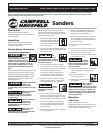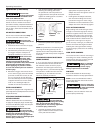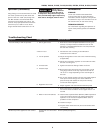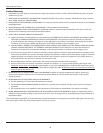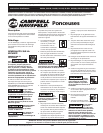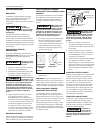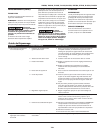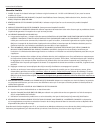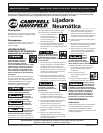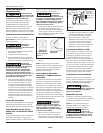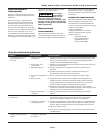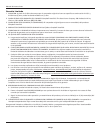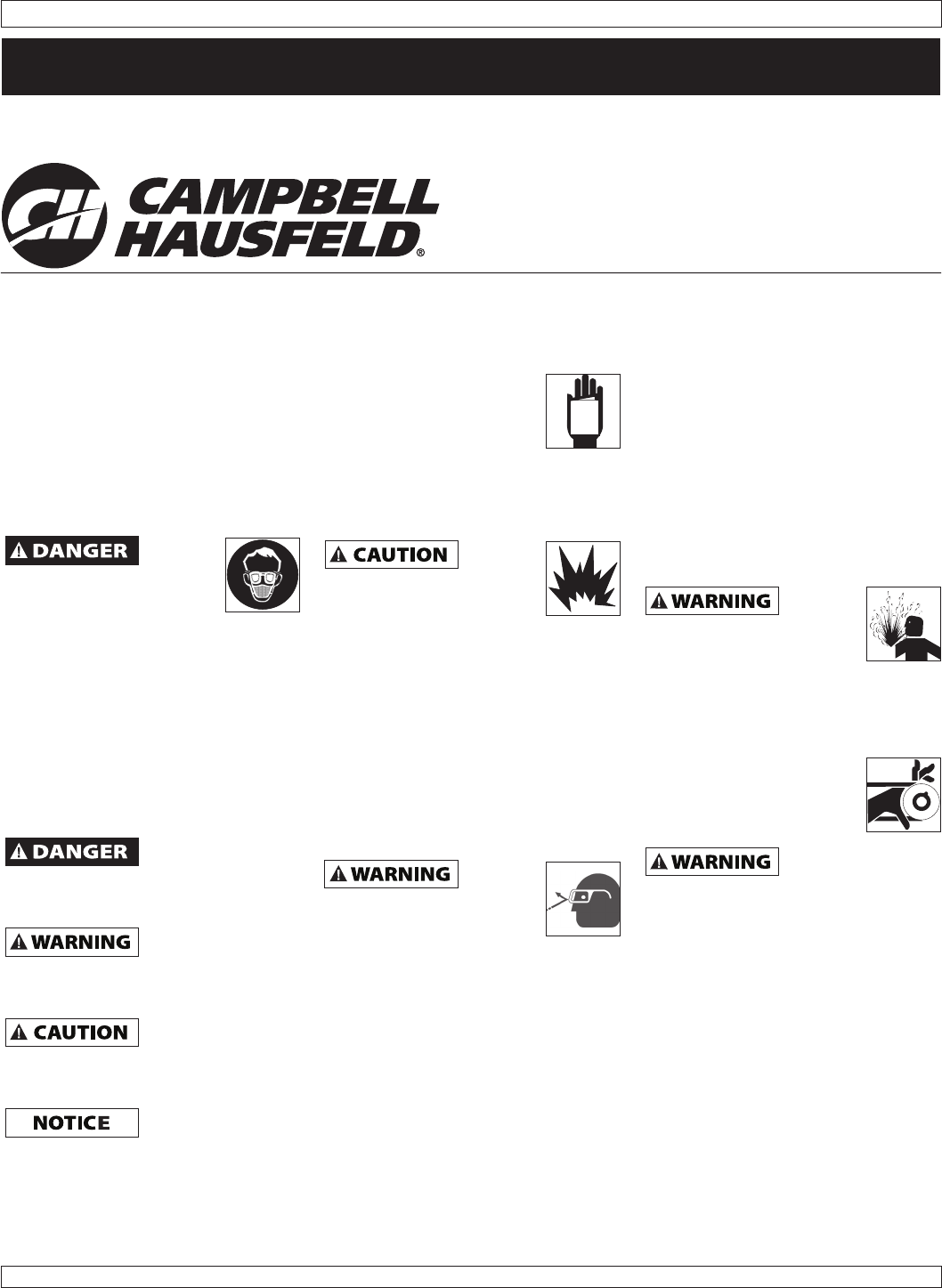
Please read and save these instructions. Read carefully before attempting to assemble, install, operate or maintain the product described.
Protect yourself and others by observing all safety information. Failure to comply with instructions could result in personal injury and/or
property damage! Retain instructions for future reference.
For parts, product & service information
visit www.chpower.com
REMINDER: Keep your dated proof of purchase for warranty purposes! Attach it to this manual or file it for safekeeping.
IN241203AV 2/10
See Warranty on page 4 for important information about commercial use of this product.
Operating Instructions TL0504, TL0518, TL1005, TL1118, PL1551, FHT504, IFT218, PL1504, TL1004
© 2010 Campbell Hausfeld/Scott Fetzer
Sanders
Description
Sanders are air tools designed for
automotive applications on both flat and
contour surfaces.
Unpacking
When unpacking this product, carefully
inspect for any damage that may have
occurred during transit.
General Safety Information
CALIFORNIA PROPOSITION 65
You can
create
dust when you cut, sand, drill
or grind materials such as
wood, paint, metal, concrete,
cement, or other masonry. This dust
often contains chemicals known to
cause cancer, birth defects, or other
reproductive harm. Wear protective
gear.
This manual contains information that is very
important to know and under-stand. This
information is provided for SAFETY and to
PREVENT EQUIPMENT PROBLEMS. To help
recognize this information, observe the
following symbols.
Danger indicates an
imminently
hazardous situation which, if not
avoided, WILL result in death or serious
injury.
Warning indicates a
potentially
hazardous situation which, if not
avoided, COULD result in death or
serious injury.
Caution indicates a
potentially
hazardous situation which, if not
avoided, MAY result in minor or
moderate injury.
Notice indicates
important
information, that if not followed, may
cause damage to equipment.
8. Always use attachments designed for
use with air powered tools. Do not use
damaged or worn attachments.
9. Never trigger the tool when not applied
to a work object. Attachments must be
securely attached. Loose attachments can
cause serious injury.
10. Protect air lines from damage or
puncture.
11. Never point an air tool at oneself or any
other person. Serious injury could occur.
12. Check air hoses for weak or worn
conditions before each use. Make sure all
connections are secure.
Release
all pressure from the system
before attempting to install,
service, relocate or perform
any maintenance.
13. Keep all nuts, bolts and screws tight and
ensure equipment is in safe working
condition.
14. Do not put hands near or
under moving parts.
15. Always secure workpiece in a
vise or clamp.
Do not misuse
this product.
Excessive exposure to vibration, work in
awkward positions, and repetitive work
motions can cause injury to hands and
arms. Stop using any tool if discomfort,
numbness, tingling, or pain occur, and
consult a physician.
Operation
LUBRICATION
Proper lubrication is the owner’s
responsibility. Failure to lubricate the air tool
properly will dramatically shorten the life of
the tool and will void the warranty.
This product is a part of a high pressure
system and the following safety precautions
must be followed at all times along with any
other existing safety rules.
1. Read all manuals included
with this product carefully. Be
thoroughly familiar with the
controls and the proper use
of the equipment.
2. Only persons well acquainted with these
rules of safe operation should be allowed
to use the air tool.
Do
not exceed the maximum
operating pressure of the air
tool (90 PSI). This can reduce
the life of the tool.
3. Do not exceed any pressure rating of
any component in the system. Maximum
operating pressure of 90 PSI is measured
at the tool inlet while the tool is
running. The pressure drop between
the compressor and tool needs to be
compensated for at the compressor.
4. Disconnect the air tool from air supply
before changing tools or attachments,
servicing and during non-operation.
Safety
glasses and ear protection
must be worn during
operation.
5. Do not wear loose fitting clothing,
scarves, or neck ties in work area. Loose
clothing may become caught in moving
parts and result in serious personal injury.
6. Do not wear jewelry when operating
any tool. Jewelry may become caught
in moving parts and result in serious
personal injury.
7. Do not depress trigger when connecting
the air supply hose.
MANUAL



